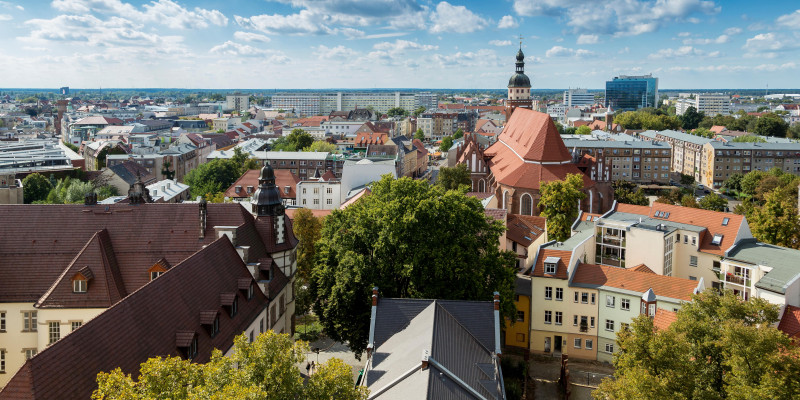Eight of the ten employees at the new UBA site in Cottbus are part of the ‘Decarbonisation in Industry’ department. They will be investigating how energy-intensive industrial processes can be made climate neutral while also taking other environmental concerns into account. Through this investigative research and with the UBA’s expertise they will support, amongst other things, a corresponding subsidy programme of the Federal Government – the Government Funding for Industry and Climate Change Mitigation (BIK). In particular, this will help to advance the electrification of industry processes as well as the reduction of process-related CO2 emissions. Two further employees focusing on transport will investigate decarbonisation options and the environmental and climate impact of heavy commercial vehicles in road traffic as well as alternative fuels in maritime shipping.
UBA President Dirk Messner on the foundation of the new UBA site in Cottbus: “The decarbonisation of our industry is a key step on the path to climate neutrality. Society’s efforts to protect our climate can only succeed with strong and efficient industry – not without it. I am convinced that we will make this process a success and I am glad that we at the UBA are able to play our part in this. Lusatia is one of the regions that will benefit from this transformation in the future, which is why Cottbus is exactly the right location for the new UBA department.”
The new UBA site in the Cottbus city centre is intended to create long-term networks with actors in the local economy and research institutions in the region and to expand on existing connections. The collaboration with regional partners such as the Competence Centre on Climate Change Mitigation in Energy-Intensive Industries (KEI), the Brandenburg Technical University (BTU) Cottbus-Senftenberg and the Think and Do Tank for Fuels and Basic Materials from Green Hydrogen (PtX Lab) is an essential part of the on-site work of UBA experts.
Dr Klaus Freytag, Lusatia Representative of the Minister-President of Brandenburg, welcomes the opening of the new UBA site in Cottbus: “The new federal authorities in Lusatia, particularly in the regional centre of Cottbus, are important partners and supporters of this structural change. With its expertise, the UBA is tackling the challenges of the transformation in the brown coal mining regions. This expertise has now arrived in Cottbus and marks a good day for the region and its people!”
Prof. Dr. Ing. Michael Hübner, Vice president of the Research and Transfer of the BTU Cottbus-Senftberg stated: “We are very happy that the UBA decided to open a new site in Cottbus. The issue of decarbonisation, which is a priority for industry and transport sectors in Cottbus and other partners such as the KEI, aligns very well with the BTU’s research. Our focus areas ‘Decarbonisation and Energy transition’ and ‘Global Change and Transformation’ serve as excellent gateways into these emerging fields and facilitate a wealth of cooperation, for example in the areas of energy and environmental protection. These offer great potential and synergies with other areas of research that we can utilise to shape a sustainable future that is worth living in.”
 Click to enlarge
Click to enlarge
